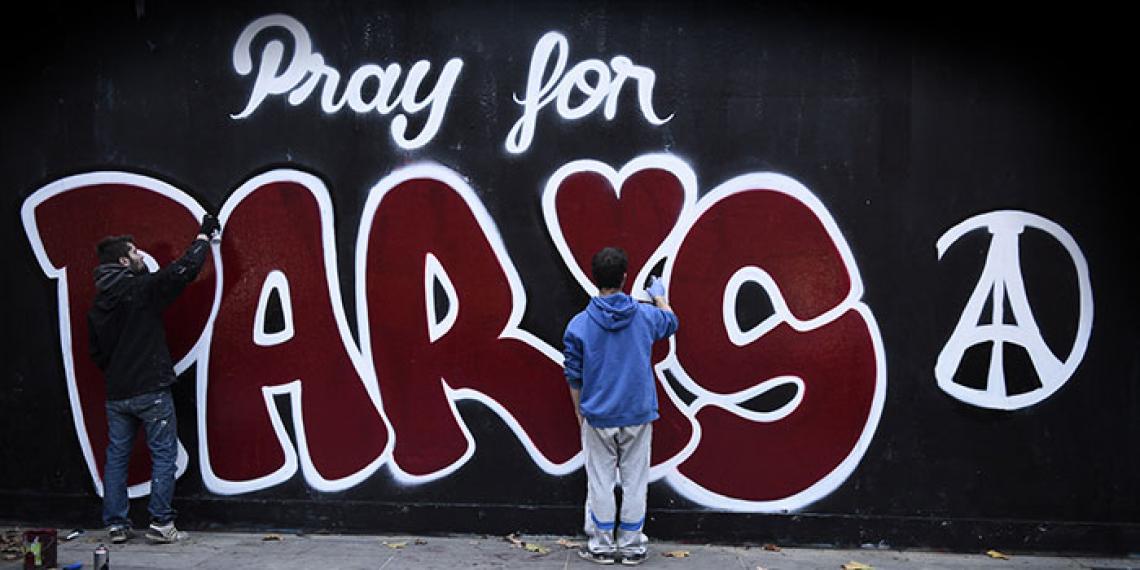You are here
Pray for Paris

I learnt about the terrorist attacks in Paris through BBC News, but my empathy and disquiet really grew via social media, as I read posts from friends and organisations.
Almost from the start, social media railed against the media’s perceived partiality. As people applied a French flag filter to their Facebook profiles and Tweets and photos tagged with #PrayforParis trended, others asked the questions that also deserved to be asked: What about those innocents murdered by terrorists elsewhere in the world? How much coverage do they get? How much value and dignity do we give them?
Probably the most compelling words came from Indian poet Karuna Ezara Parikh, whose father was raised in Beirut:
It is not Paris we should pray for. It is the world. It is a world in which Beirut, reeling from bombings two days before Paris, is not covered in the press. A world in which a bomb goes off at a funeral in Baghdad and not one person’s status update says ‘Baghdad’, because not one white person died in that fire.
Pray for the world that blames a refugee crisis for a terrorist attack. That does not pause to differentiate between the attacker and the person running from the very same thing you are. Pray for a world where people walking across countries for months, their only belongings upon their backs, are told they have no place to go. Say a prayer for Paris by all means, but pray more for the world that does not have a prayer, for those who no longer have a home to defend. For a world that is falling apart in all corners and not simply in the towers and cafés we find so familiar.
I was profoundly challenged by these words, particularly as I believe everyone is equal in the sight of God. And yet I confess, to my shame, I’m woefully ignorant of what’s happening in many of the world’s trouble spots. But can I really blame the media for this?
Max Fisher, foreign editor of Vox.com, pointed out in an article headlined ‘Did the media ignore the Beirut bombings? Or did readers?’ that the media did, in fact, cover the Beirut bombings extensively. Many other media reports of mass acts of violence outside the West seem also to have largely escaped those now complaining on social media. So, I guess I can’t simply blame the media for simplistic or selective news coverage; I have to look at my own browsing history.
Of course, this doesn’t let the media off the hook, because it’s also true that they do concentrate their energies on those stories they believe their (paying!) audience is most likely to consume. But, at the same time, the media is open to people power.
Folker Hanusch of the Queensland University of Technology, writing for TheConversation.Com, says website analytics prove that many of us simply don’t want to click on stories from countries that are ‘not like us’. And while that’s happening, it’s little wonder that the media aren’t motivated to change the news values that guide their story selection.
Hanusch gives the example of a multiple murder-suicide story that an editor told him was tracking well online until it became clear that the people involved were indigenous. Then, the editor said, ‘readership figures dropped drastically’.
As active consumers of news, we can shift the media’s news coverage to give us the vital resource of information from which empathy, compassion and even political solutions grow. If we start clicking on even the tiny international stories on our news feeds, these clicks count. We can help tip the balance as click-by-click we send the message that we want a higher standard of in-depth global reporting and social commentary.
But it’s also important to acknowledge that some of what we want is already out there—although we’ll probably need to look further than our default Facebook news feeds and read more than a few 140-character Tweets. And, of course, we need to keep praying—for Paris … and the world.
by Christina Tyson (c) 'War Cry' magazine, 28 November 2015, pp 3.
You can read 'War Cry' at your nearest Salvation Army church or centre, or subscribe through Salvationist Resources.